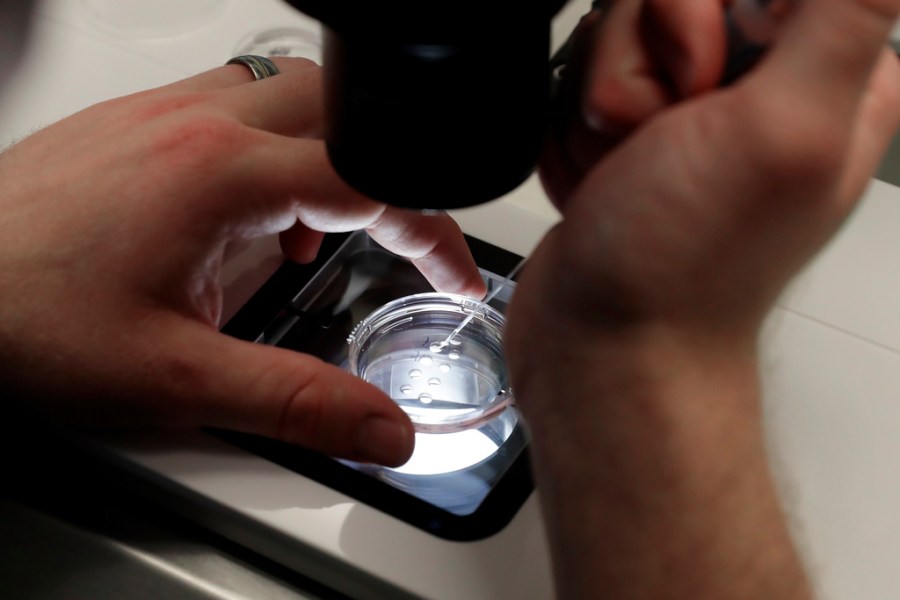
During the 2024 election campaign, President Trump and other Republicans on Capitol Hill expressed strong support for in vitro fertilization as an important tool in forming families. This past Tuesday evening he issued an executive order directing his Domestic Policy Council to develop recommendations to “lower costs and reduce barriers” to the practice.
While it is doubtless true that in vitro fertilization has enabled many parents to have the beautiful blessing of longed-for children, self-governance on this issue is enormously complicated and serious caution warranted.
More than 20 years ago, we helped to counsel another U.S. president on the vexing complexities of regulating assisted reproductive technologies. We have been carefully studying the ethical and legal dimensions of the matter ever since. We respectfully advise Trump and his team to proceed slowly and with great care, as this issue is much harder than it seems.
First, this is an area of medicine like no other. This is the only medical context in which the treatment consists in the creation of a new human being. In vitro fertilization allows procreation to be fractured into its component parts, creating an array of multiple potentially vulnerable people — genetic parents, gestational parents, rearing parents, and, of course, the children conceived and born with its aid.
Second, there is much we still don’t know about key health and safety issues. The CDC itself has identified an association with the use of in vitro and birth defects and other maladies. In vitro fertilization has a well-known heightened incidence of preterm births with attendant serious risks for mothers and children. Yet there are still no federally funded longitudinal studies on the health and well-being of in-vitro mothers and babies.
Third, in vitro fertilization as such is not subject to meaningful regulation. Twenty-one years ago, the President’s Council on Bioethics (on which we served as senior staff) found that there is no “no comprehensive, uniform, and enforceable mechanism for data collection, monitoring, or oversight, of how the new reproductive biotechnologies affect the well-being of the children conceived with their aid, the egg-donors, or the gestational mothers.”
The same remains true today. Novel experimental procedures quickly make their way into routine practice.
The only federal law on the books is a weak consumer protection law which lacks any significant enforcement mechanism and fails to make available full information to prospective parents concerning crucial matters such as the incidence of adverse health outcomes for mothers and babies or the costs of procedures. Accordingly, observers across the political spectrum have referred to the legal landscape for in vitro fertilization as “the Wild West.”
Fourth, within this regulatory vacuum, the industry has failed to earn preferred treatment and subsidies from the federal government. And it has not policed itself, instead allowing practitioners to offer ethically questionable services such as screening of embryos for elective sex selection (available in at least 73 percent of American clinics) and other non-medical traits such as hair and eye color. One company even offers “polygenic risk scores” for intelligence. Sperm, eggs and even “batches” of embryos are sold at a discounted rate and organized according to preferred traits.
Fifth, in vitro fertilization involves the creation, screening, storage, and sometimes destruction of human beings at the embryonic stage of development. There is no definitive information on how many embryonic human beings are currently frozen in cryo-storage in the U.S., though some estimates suggest it could be 1 million or more. For any elected official who cares about the intrinsic equal dignity and matchless worth of every human being, born and unborn, protecting the weakest and most vulnerable in this context must be of paramount concern.
Under no circumstances should the federal government promote medical practices that result in the intentional or negligent destruction of human life at any stage of development.
Before moving forward with any concrete measures to promote in vitro fertilization, Trump’s team should carefully study all of the above concerns in their full complexity — safety of mothers and babies, the current absence of meaningful regulation, widespread ethically questionable practices of the in vitro fertilization industry, and the risks to uniquely vulnerable people longing to be parents as well as to their children at every stage of development.
Most importantly, in its deliberations, the Trump team should hold in its collective mind that the animating purpose of all of these efforts is to build a world in which all children are protected, welcomed and loved unconditionally as the gifts they are.
Carter Snead is the Charles E. Rice Professor of Law at the University of Notre Dame, a Fellow of the Ethics and Public Policy Center and was general counsel to President George W. Bush’s Council on Bioethics. Yuval Levin is director of Social, Cultural, and Constitutional Studies at the American Enterprise Institute and was executive director of President George W. Bush’s Council on Bioethics.












